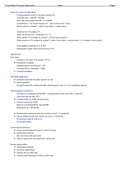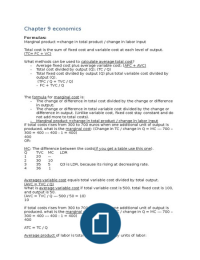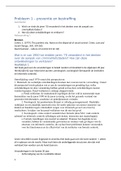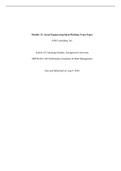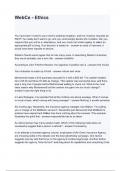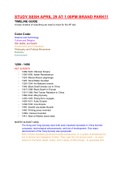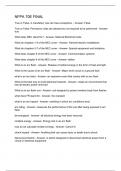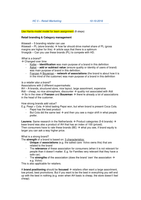Consolidated Financial Statements Steps Page 1
Paper-for-paper consideration
P issues sharesP worth A to acquire sharesS of S
exchange ratio = sharesP / sharesS
Each new share issued is worth = A / sharesP
Consideration = new shares issued by P * value of new share * %acq
Share premium = sharesP * (value of new share - nominal value)
Adjustments in the equity of P
Open new account in P: Investment in S = A
Share capital of P increases by sharesP * nominal value (usually 1)
Share premium of P increases by sharesP * (value of new share - nominal value) = A - increase in share capital
check against investment in S on B/S
Shareholder’s equity should only be those of P’s
Adjustments
Fair value
Increase in fair value of net assets (=TA-TL)
Dr Revaluation increases
Increases group by revaluation * %CI
Increases NCI by revaluation * %NCI
Cr Goodwill decreases
Goodwill impairment
Dr Goodwill impairment (Increase expense on I/S)
Cr reduce goodwill
Goodwill impairment is deducted after operating profit, since it’s not an operating expense
Intercompany transactions
Provision for unrealised profit (PURP) = remaining stock*mark-up%/(100 + markup%)
Upstream sale (S sells to P)
Dr increase COGS by PURP (whole amount)
Cr Reduce inventory by PURP
Reduce consolidated RE by %acq*PURP
Reduce NCI by %NCI*PURP
Dr Reduce sales revenue by post-acq inventory at cost * (1+markup%)
Cr reduce COGS by post-acq inventory at cost * (1+markup%),
Downstream sale (P sells to S)
Do the same thing
Intercompany balances
Dr reduce trade payables/increase S's cash if banked
Cr reduce trade receives
they cancel out with each other
Dr Cash in transit (if the two above don't cancel out)
Excess depreciation
Dr depreciation expense
Cr item that's depreciated
Dr reduces NCI by %NCI*dep
Cr reduces profit attributable to NCI by %NCI*dep
, Consolidated Financial Statements Steps Page 2
If acquisition happens in the middle of the financial year (think consolidation example)
Net profit needs to be adjusted for expenses that happen pre/post-acquisition
E.g. needs to remove finance cost that only happens post-acquisition
Pre-acquisition profit = net profit * pre-acq-portion +/- things that only occur pre-acq
Post-acquisition profit = net profit * post-acq-portion +/- things that only occur post-acq
post-acquisition P advanced a loan to S and S paid interest (finance cost)
cancel finance cost and finance income by the same amount
before split profit: increase profit for the year by interest paid (finance cost)
after split profit: reduce post-acq profit by interest paid (finance cost)
post-acquisition S advanced a loan to P and P paid interest (finance income)
cancel finance cost and finance income by the same amount
before split profit: reduce profit for the year by interest received (finance income)
after split profit: increase post-acq profit by interest received (finance interest)
Dividends
Dividends proposed but not declared
Dr Dividend Proposed
Cr Retained earnings
Dividends paid by S from pre-acquisition profits
on analysis of S's equity
Dr after split profit for the year (e.g. S's profit*pre-acq portion), reduce by dividend paid
Cr (these will be reflected automatically)
Dividends from pre-acquisition profits (S to P)
turning assets acquired by P to P (like cashback!)
Dr S’s pre-acquisition reserves (split between group and NCI)
Cr Consideration = original consideration - dividends*%acq
Net effect on goodwill = 0
Dividends paid - Need to be eliminated (restating S’s accounts)
Dr Dividend Income (P)
Cr Retained earnings (S)
Profit attributable to NCI
NCI% * S’ profit after tax post-acquisition
* note: NCI%*profit after tax post-acq is c in analysis of equity
- NCI%*PURP (only if it's upstream sale)
- NCI% * Excess Depreciation
- NCI% * other accounting policy adjustments)
Full goodwill recognition
Fair value of NCI = S’s share price x NCI% x S’s total number of shares
fair value of S's total net assets = share capital + revaluation + RE b/f + pre-acq profit
OR: = share capital + revaluation + RE c/f - post-acq profit
Fully recognised goodwill =
price of consideration
+ fair value of NCI
- fair value of S's total net assets (d on analysis of equity)
= Goodwill arising on acquision
- impairment
Paper-for-paper consideration
P issues sharesP worth A to acquire sharesS of S
exchange ratio = sharesP / sharesS
Each new share issued is worth = A / sharesP
Consideration = new shares issued by P * value of new share * %acq
Share premium = sharesP * (value of new share - nominal value)
Adjustments in the equity of P
Open new account in P: Investment in S = A
Share capital of P increases by sharesP * nominal value (usually 1)
Share premium of P increases by sharesP * (value of new share - nominal value) = A - increase in share capital
check against investment in S on B/S
Shareholder’s equity should only be those of P’s
Adjustments
Fair value
Increase in fair value of net assets (=TA-TL)
Dr Revaluation increases
Increases group by revaluation * %CI
Increases NCI by revaluation * %NCI
Cr Goodwill decreases
Goodwill impairment
Dr Goodwill impairment (Increase expense on I/S)
Cr reduce goodwill
Goodwill impairment is deducted after operating profit, since it’s not an operating expense
Intercompany transactions
Provision for unrealised profit (PURP) = remaining stock*mark-up%/(100 + markup%)
Upstream sale (S sells to P)
Dr increase COGS by PURP (whole amount)
Cr Reduce inventory by PURP
Reduce consolidated RE by %acq*PURP
Reduce NCI by %NCI*PURP
Dr Reduce sales revenue by post-acq inventory at cost * (1+markup%)
Cr reduce COGS by post-acq inventory at cost * (1+markup%),
Downstream sale (P sells to S)
Do the same thing
Intercompany balances
Dr reduce trade payables/increase S's cash if banked
Cr reduce trade receives
they cancel out with each other
Dr Cash in transit (if the two above don't cancel out)
Excess depreciation
Dr depreciation expense
Cr item that's depreciated
Dr reduces NCI by %NCI*dep
Cr reduces profit attributable to NCI by %NCI*dep
, Consolidated Financial Statements Steps Page 2
If acquisition happens in the middle of the financial year (think consolidation example)
Net profit needs to be adjusted for expenses that happen pre/post-acquisition
E.g. needs to remove finance cost that only happens post-acquisition
Pre-acquisition profit = net profit * pre-acq-portion +/- things that only occur pre-acq
Post-acquisition profit = net profit * post-acq-portion +/- things that only occur post-acq
post-acquisition P advanced a loan to S and S paid interest (finance cost)
cancel finance cost and finance income by the same amount
before split profit: increase profit for the year by interest paid (finance cost)
after split profit: reduce post-acq profit by interest paid (finance cost)
post-acquisition S advanced a loan to P and P paid interest (finance income)
cancel finance cost and finance income by the same amount
before split profit: reduce profit for the year by interest received (finance income)
after split profit: increase post-acq profit by interest received (finance interest)
Dividends
Dividends proposed but not declared
Dr Dividend Proposed
Cr Retained earnings
Dividends paid by S from pre-acquisition profits
on analysis of S's equity
Dr after split profit for the year (e.g. S's profit*pre-acq portion), reduce by dividend paid
Cr (these will be reflected automatically)
Dividends from pre-acquisition profits (S to P)
turning assets acquired by P to P (like cashback!)
Dr S’s pre-acquisition reserves (split between group and NCI)
Cr Consideration = original consideration - dividends*%acq
Net effect on goodwill = 0
Dividends paid - Need to be eliminated (restating S’s accounts)
Dr Dividend Income (P)
Cr Retained earnings (S)
Profit attributable to NCI
NCI% * S’ profit after tax post-acquisition
* note: NCI%*profit after tax post-acq is c in analysis of equity
- NCI%*PURP (only if it's upstream sale)
- NCI% * Excess Depreciation
- NCI% * other accounting policy adjustments)
Full goodwill recognition
Fair value of NCI = S’s share price x NCI% x S’s total number of shares
fair value of S's total net assets = share capital + revaluation + RE b/f + pre-acq profit
OR: = share capital + revaluation + RE c/f - post-acq profit
Fully recognised goodwill =
price of consideration
+ fair value of NCI
- fair value of S's total net assets (d on analysis of equity)
= Goodwill arising on acquision
- impairment

